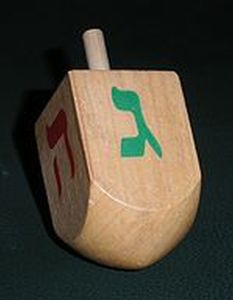 New York, December 23 – Gyrone, a four-year-old decorative dreidel, has become increasingly frustrated over the years with the ignorance displayed by anyone and everyone he encounters, and their short attention span.
New York, December 23 – Gyrone, a four-year-old decorative dreidel, has become increasingly frustrated over the years with the ignorance displayed by anyone and everyone he encounters, and their short attention span.
“Nobody seems to have any idea what I’m all about, and their misapprehension of my purpose,” he lamented in a recent interview. “People seem to think I have some inherent connection to Hanukkah – and I have no idea how that happened.”
“I’m just a teetotum,” he added, wondering how anyone could confuse gambling with a celebration of divine wisdom as represented by light.
Dreidels are a specific type of teetotum, a polygon-shaped spinning top used in games of chance. Teetotums are marked with the outcome on each face, indicating what action should be taken as a result of the spin. On the dreidel, a four-sided teetotum, the markings use Hebrew letters that stand for Yiddish instructions: nothing, take the whole pot, take half the pot or add to the pot.
“I wish I knew whom to blame for this,” Gyrone continued, “but no one seems to know who first took those letters and said they really stand for ‘A great miracle happened there’ in Hebrew. Whoever it was, I’d like to throttle him. If I had arms, anyway,” he added ruefully. The miracle to which he referred was of oil that miraculously burned for eight nights when only enough uncontaminated olive oil could be found for one night, according to the Talmud, after the Jews rose up against the Seleucid oppressors and reclaimed the Temple.
“To make things worse,” continued Gyrone, his tone rising, “then some fool in Israel decided to put a local spin on it: since the miracle happened there, the dreidels used in Israel should use the initial for the Hebrew word ‘here’, and a bastardized teetotum was born.”
The connection with Hanukkah might be attributed to Jewish legends about religious persecution at the hands of the Seleucid rulers of the second century BCE. Those tales recount bans on various elements of Jewish practice, including the study of Torah, and how Jews would circumvent the prohibitions by having children play games to divert the Hellenistic authorities and their informers from the true goings-on. It is unclear when, but at some later point the game of dreidel was specifically mentioned in that context, even though nothing specific about the games is part of the original legend.
For most Jewish families, the game of dreidel loses its novelty after about four minutes; the average life span of a typical plastic or wooden dreidel is between two and seven days, as the cheap toys are ignored, neglected, lost, disposed of or chewed up by the family dog. Decorative dreidels are luckier in that respect, though seldom used, according to Zvi Vohn, Professor of Jewish Culture at Columbia University. “There’s an appalling lack of imagination when it comes to the game of dreidel as it’s typically played,” he explained. “Pennies? Chocolate coins? No wonder people get bored. Heck, one of the reasons my brother married a shiksa is that he couldn’t stand the boredom of dreidel.”
“We Jews are a creative bunch. I’m sure there’s some way we can give this classic game a clever twist.”




